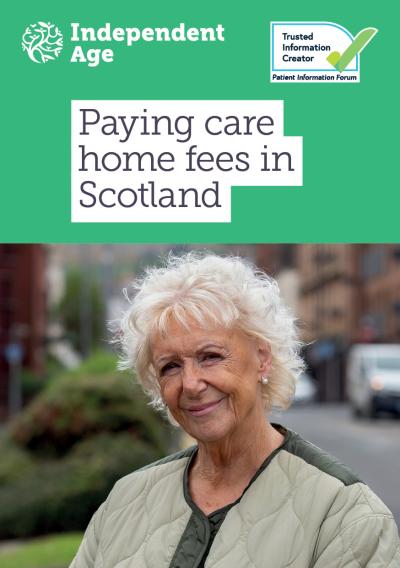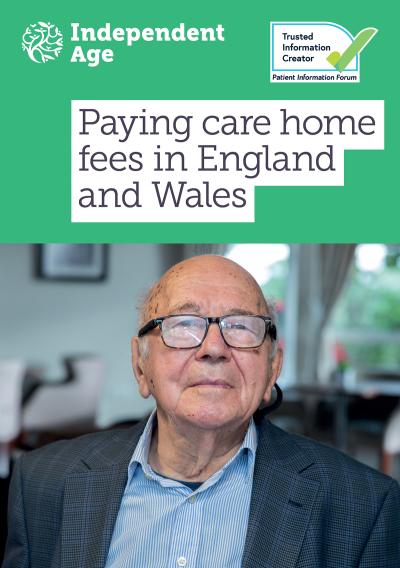Related publications

Paying care home fees in Scotland

If your council is paying for some or all of your care but you’d like to move somewhere that costs more than they’ll pay, you might be able to make up the difference with a top-up fee.
If your council is contributing towards your care home fees, they must tell you how much they think your care should cost. At your financial assessment, your council will work out how much you will have to pay towards your care, and whether you are entitled to financial help from the council. For more information, read our guides Paying care home fees in England and Wales and Paying care home fees in Scotland.
In England and Scotland, the council must show there is at least one place available at a care home in your area that:
In Wales, the council must give you at least 2 different care homes that fit this criteria, so you can decide which one you would prefer.
If you’d prefer a different, more expensive home, you may still be able to move there if someone pays the difference between the fees and the cost of your care. This is a top-up fee.
For more information on choosing care homes, see our guide How to find the right care home.
You can’t usually pay your own top-up fees; they’re generally paid by a third party, such as a friend, relative or charity. If you’ve agreed to pay a top-up fee for someone else, you’ll be asked to sign a contract, preferably with the council who will then pay the care home. The council must be satisfied that you’re willing and able to pay the top-up fee for as long as it’s needed.
You can only pay your own top-up fees in one of the following situations:
The contract for the top-up fee must explain important points, including:
If you’re unclear about, or disagree with, any aspect of the top-up fee agreement, do not sign it and get advice instead. Call our Helpline on 0800 319 6789 to arrange to speak to adviser.
If your chosen home is more expensive than the cost of your care
This is when you may need to arrange top-up fees. However, before asking for a top-up, the council must be able to show that:
Only after this can they say you have chosen a more expensive home and will need to arrange a top-up to be able to move there.
If you were paying all your care home fees, but your money is running out
If you’re already living in a care home and paying your own fees, and your capital falls below a certain amount (£23,250 in England, £32,750 in Scotland or £50,000 in Wales), you’ll usually qualify for some help from your council to pay the fees. However, it may be that your care home charges more than the amount the council thinks is required to meet your care needs.
If this is the case, and there are other suitable care homes available which are less expensive, the council may either:
The council will have carried out a care needs assessment to assess your care needs, and a financial assessment to decide the cost of your care. This needs to be enough money to ensure you get the care you need. The assessment must consider what your care and support needs are and the impact of these needs on your physical and mental health, emotional and social wellbeing, and personal relationships, among other things.
If your care needs change, it may mean that it will cost more to meet your needs. In this case, the council must consider increasing the amount it is prepared to pay – for example, they may agree that:
Sometimes, the council may only temporarily increase the amount they’re paying towards your care, until a suitable cheaper care home place becomes available.
Care home fees usually increase annually, but the council may not increase its contribution to the cost of your care, so be aware that your top-up fee could increase.
In this case, you can ask the council if there is another, cheaper care home in the area that can meet your care needs. If there is, you will have the option to move to this care home.
However, if there isn’t a cheaper care home available that can meet your care needs, the council will have to increase its contribution to the cost of your care, to cover the care home fee increase. Check for information about fee increases in the contract with the care home.
If the person paying the top-up fee can no longer afford to pay it, the council has to carry out a new care needs assessment before deciding what to do.
They won’t be able to just move you to a cheaper care home to resolve the need for the top-up fee. First, the council must consider whether the new care home can meet all your care needs and the impact the move might have on your health and wellbeing. In the meantime, the council would be responsible for covering the fees. For more information, call us on 0800 319 6789 to speak to an adviser.
You might be able to challenge a top-up fee request on a number of grounds. If, for example:
To challenge the request, you can use the council’s complaints procedure or seek legal advice. There is a time limit for using each of these procedures, so it’s important not to miss these deadlines. See our page Complaints about care and health services for more information.
If you’ve been asked for a top-up fee and don’t think you should have been, call us on 0800 319 6789 for advice.

For more information, see our guides Paying care home fees in England and Wales or Paying care home fees in Scotland.